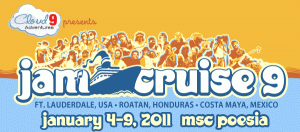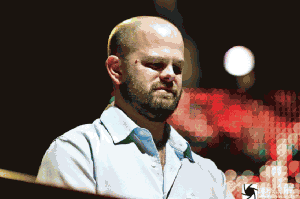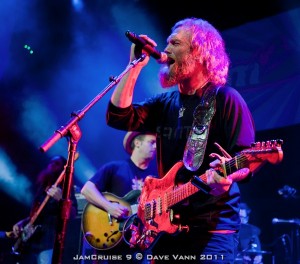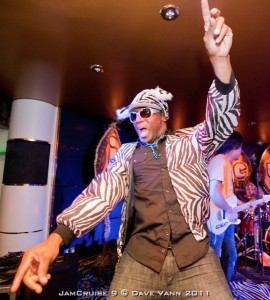After seeing the SNL digital short, I thought I knew a thing or two about being on a boat. But Jam Cruise 9 totally opened my eyes (and ears) to the excitement behind that phrase, “I’m on a boat!” The best part about this particular boat, aside from the fact that it’s JAM CRUISE, is that I’m sailing around the Gulf of Mexico with some of my favorite artists from the Gulf Coast: Galactic, George Porter Jr., Ivan Neville, Leo Nocentelli, Big Sam, Anders Osborne… and the list goes on! Jam Cruise has always embraced the music of New Orleans, but this year there seemed to be a funky New Orleans beat playing at all times. I also had the chance to sit down with some of these all-time greats and get their opinions on life, politics, music and rebuilding in the Gulf Coast - topics that truly fire their passions.
George Porter Jr.: "Get Pissed Off!", Galactic’s Rich Vogel: “At Who?”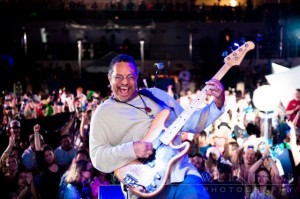
It was day one at sea on Jam Cruise 9. The energy and spirits were high. George Porter, Jr., a five-year Jam Cruise veteran, was psyched to carry his bass on his back and head from stage to stage. We caught up during some down time to talk about the crazy past year in Louisiana and how the region can move forward. When I asked him how he would describe 2010 in Louisiana, he said, “The people of Louisiana are just not pissed off enough.” He lamented that complacency is becoming a big problem in Louisiana, and serious issues are being overlooked. He quoted his mother, saying, “The squeaky wheel gets the oil.”
Galactic’s Rich Vogel agreed with George, but added that there is some confusion about who exactly to be pissed off at. One candidate, and I’m not talking presidential, is Louisiana Governor Bobby Jindal. Both George and Rich referred to Jindal as a "joke" although they were not amused. There seems to be a common feeling among the artists I spoke with that Jindal is a strong leader that showed promise in the beginning of his term, but ever since talk of Jindal running for the Oval Office started surfacing, he has forgotten about his role as the leader of Louisiana.
At least for Big Sam and Anders Osborne, Nola's Mayor Mitch Landrieu is not a candidate for getting too pissed off at. For the most part, Mayor Landrieu is scoring high marks among the New Orleans musicians I spoke with. Despite the stir he caused by trying to ban street performers, both Big Sam and Anders agree that positive changes have been seen coming from City Hall. Sam even said: “He’s like a pastor of a small church.”
Big oil vs. Louisiana – Strategies for Winning the Battle
It's important to be aware of the fact that the oil industry in Louisiana isn’t going anywhere. Most of these musicians, along with other Louisiana residents, believe that more of the royalty revenue and oil money needs to come back to the state, in order to start undoing the damage that’s been done. “We should be getting 90% of the oil revenue back to us,”
said George. Both he and Rich agree that the give-and-take between Louisiana and the oil industry has been largely disproportionate for decades. However, Rich pointed out that the oil industry and the sectors built around it provide “some of the best-paying jobs we have in this poor state that does not have a very diverse economy.”
Rich, who comes from a family of engineers, likes to talk engineering. He described one of his ideas for a way to combat the damage: stage a large-scale sediment re-diversion program in the Mississippi river, essentially channeling the parts of the river where the sediment goes toward the marsh, rather than into the deep ocean. He said it’s much better than Bobby Jindal’s “political sideshow” of a solution, which was based on the premise that creating sandbars to stop oil and erosion was good science. According to Rich, now what is needed is better engineering across the board, from the wetlands to the levees, to undo the bad engineering that has set New Orleans and Louisiana up for failure.
Save Our Wetlands!
The whole New Orleans gang that I sat down with – George Porter, Jr., Rich Vogel, John “Jojo” Hermann, Big Sam and Anders Osborne – spoke up about saving the wetlands. Jojo, on the boat with his Mardi Gras Band but best known for the sound of his keys with Widespread Panic, refers to the wetlands as the lifeblood of New Orleans and the entire region. (The indigenous Nola resident wonders why it is that Jojo, who is not a Louisiana native, can see how important the wetlands are, but our own government can’t figure it out.) George pointed out that “Tab Benoit has been out there preaching [to Washington] about the wetlands for 25-30 years.” Tab goes to the politicians and talks about fixing the Gulf – or the Gulf un-fixing Louisiana – “but nobody listens to him.”
Despite the fact that the Saints were struggling through their first-round playoff game during our interview, Anders spoke passionately about his work with Tab Benoit and the Voice of the Wetlands organization. He and the others involved are trying to present a real “face of saving the wetlands in Louisiana.” The All-Stars do everything from tour the country playing great tunes to touring the marshes from the sky, all while filming and making commentary on the erosion. Anders is hoping for the Gulf to "find alternative resources… Be more progressive.”
Not everyone understands the impact the oil has had and will continue to have on the Gulf ecosystem. Even though Rich 'fessed up to eating a shrimp po-boy from his corner store every once in a while, he said that he and his family have been more cautious about the seafood they eat. He said that it is important for people not to forget about the spill just because most of the oil is visibly gone. “Just because you can’t see the oil in the water doesn’t mean the water is right.” He spoke strongly about the importance of “monitoring the next couple of generations of seafood that will tell a lot about the story.”
Despite a long struggle in the years after Katrina, Big Sam still loves his city. He re-affirmed the story we've heard countless times: after the disaster, many musicians were out of work and had to relocate, sometimes making huge sacrifices to get gigs. “There were no gigs and nobody had any kind of income coming in. Unless you were an established band already on tour, you didn’t have any shows in New Orleans.”
Despite the fact that many have returned, some still feel kicked out or left behind by Louisiana. George attributes this to the fact that “The federal government came down and took almost 98,000 people out of New Orleans and shipped them all over the US and Canada.” According to Sam, “The prices are outrageous for apartments”; this leads to “people that want to come back that can’t, because they can’t afford it.” As a matter of fact, the state is set to lose an advocate in the form of a congressional seat next term due to population loss. George Porter and some of the other musicians see this sad fact as a step in the wrong direction in terms of bringing needed attention to the problems endured by the Gulf States. As for the government's perspective on the relocated citizens? “The idea of letting those people come back home was never there.” This is hard to hear from someone so closely connected to the city.
Musical Inspiration
On a much lighter note, Jojo Hermann was a blast to talk with. The story of his side project gets down to the roots of New Orleans music. “Somebody gave me a record by Professor Longhair and said, ‘You should listen to this!'” he says. After spending many years in New York learning the piano by listening to Doors records, he heard the Professor and dug the sound so much that he put together a side project almost completely dedicated to the Professor. One of the greatest 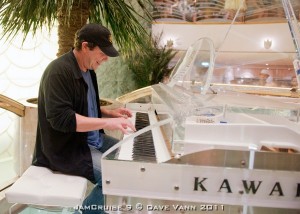 parts about it was that Jojo was able to hook up with Alfred “Uganda” Roberts, who started out playing with Professor Longhair, and who “really invented all those Afro-Cuban sounds.”
parts about it was that Jojo was able to hook up with Alfred “Uganda” Roberts, who started out playing with Professor Longhair, and who “really invented all those Afro-Cuban sounds.”
Big Sam’s musical journey is almost the exact opposite. New Orleans born and bred, he started fresh out of high school with the Dirty Dozen Brass Band, and had his life changed by an experience with Widespread Panic. “Who is Widespread Panic? Why are we playing to a big empty field?” he asked himself, during one of Dirty Dozen’s many dates opening for Panic. But later, Sam said, when 20,000 fans showed up, he realized the true power of music. Karl Denson and Tiny Universe also inspired him and even gave him the spark for the name of his band, Big Sam’s Funky Nation, which Karl’s drummer has described as “us on steroids.” As always, Jam Cruise is a place where younger generations inspired by the older generations all share the same same stage.
What's Next?
So, what’s next musically from our friends in New Orleans? Well, George is going to “boldly go where no man has gone before,” with Bill Kreutzman and the rest of the 7 Walkers, while Galactic is going to get down with the versatile vocal cords of Cory Glover, best known for his time as the front man for Living Colour (Rich Vogel describes him as a “bad dude." -- Nuff said). Jojo Hermann was excited to talk about his work with the New Orleans Musicians Clinic. He, among many others, will be at Down on the Bayou again this year promoting that organization. We can also look forward to the Widespread Panic 25th anniversary shows in Athens and Atlanta, Georgia next month. Big Sam is going to keep his nation funky with more tour dates. Anders, along with a very exciting west coast run with the Voice of the Wetlands All-stars, will be producing some other albums and will be heading back into the studio to record a new album that we can look out for in 2012.
Enjoying Jam Cruise with these musicians – as a fan, and as HeadCount’s Gulf Coast Recovery Issues Editor - was a once-in-a-lifetime event. But here’s hoping that Jam Cruise continues to be an annual celebration of progress in the Gulf.
Pictures from the top:
George Porter, Jr. -- Photo by Michael Weintrob
Rich Vogel -- Photo by Chad Smith
Anders Osborne -- Photo by Dave Vann
Big Sam -- Photo by Dave Vann
Jojo Hermann -- Photo by Dave Vann
